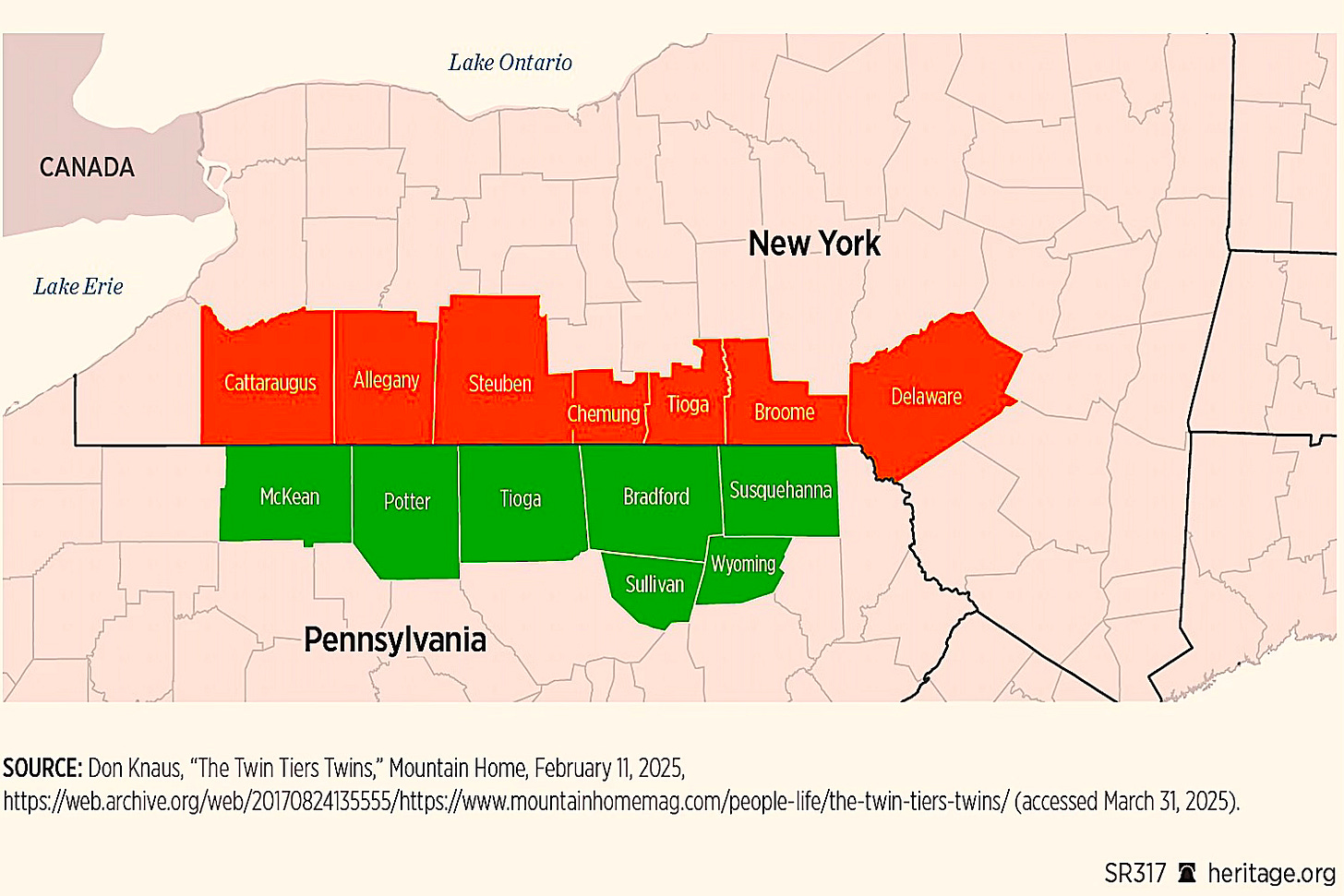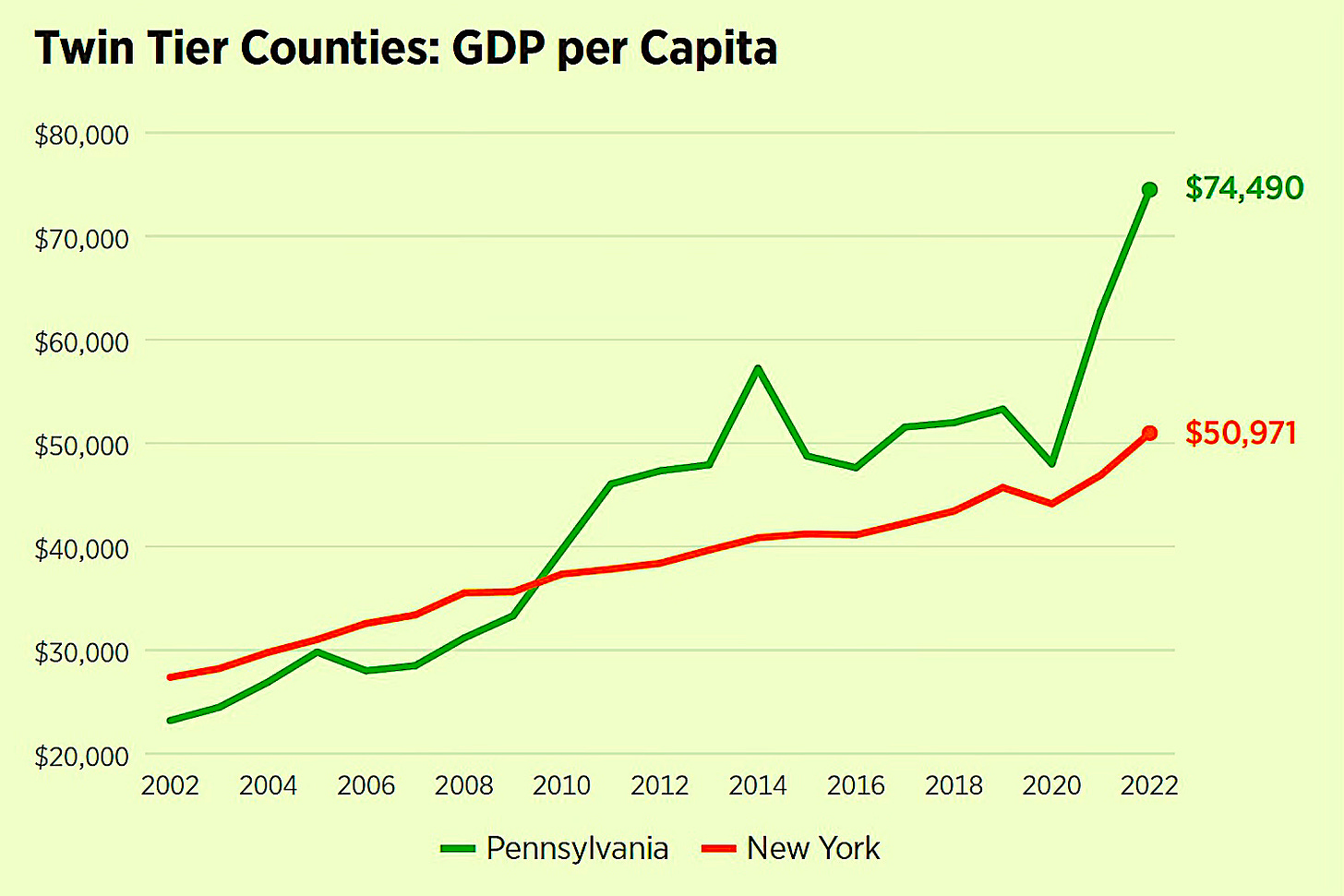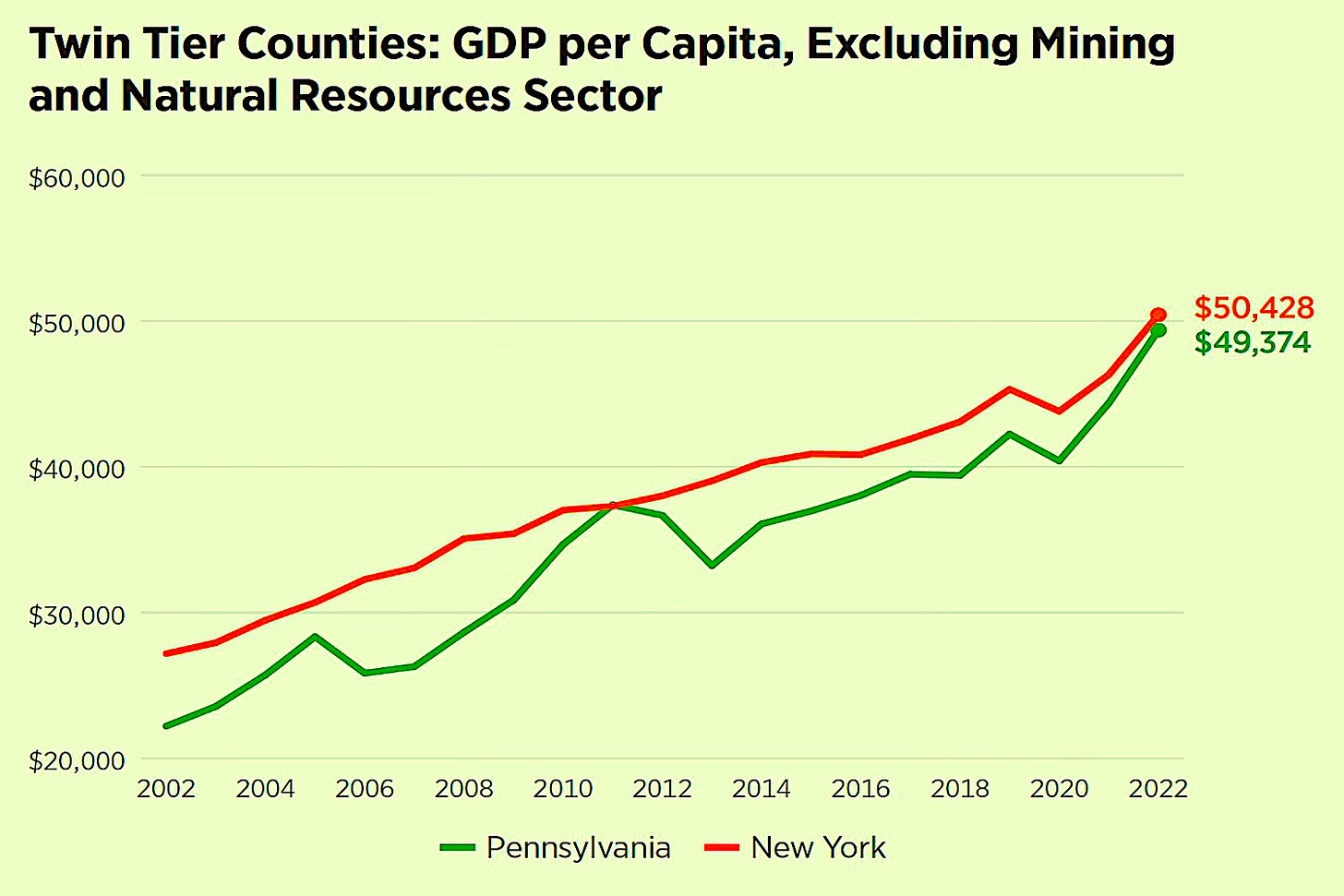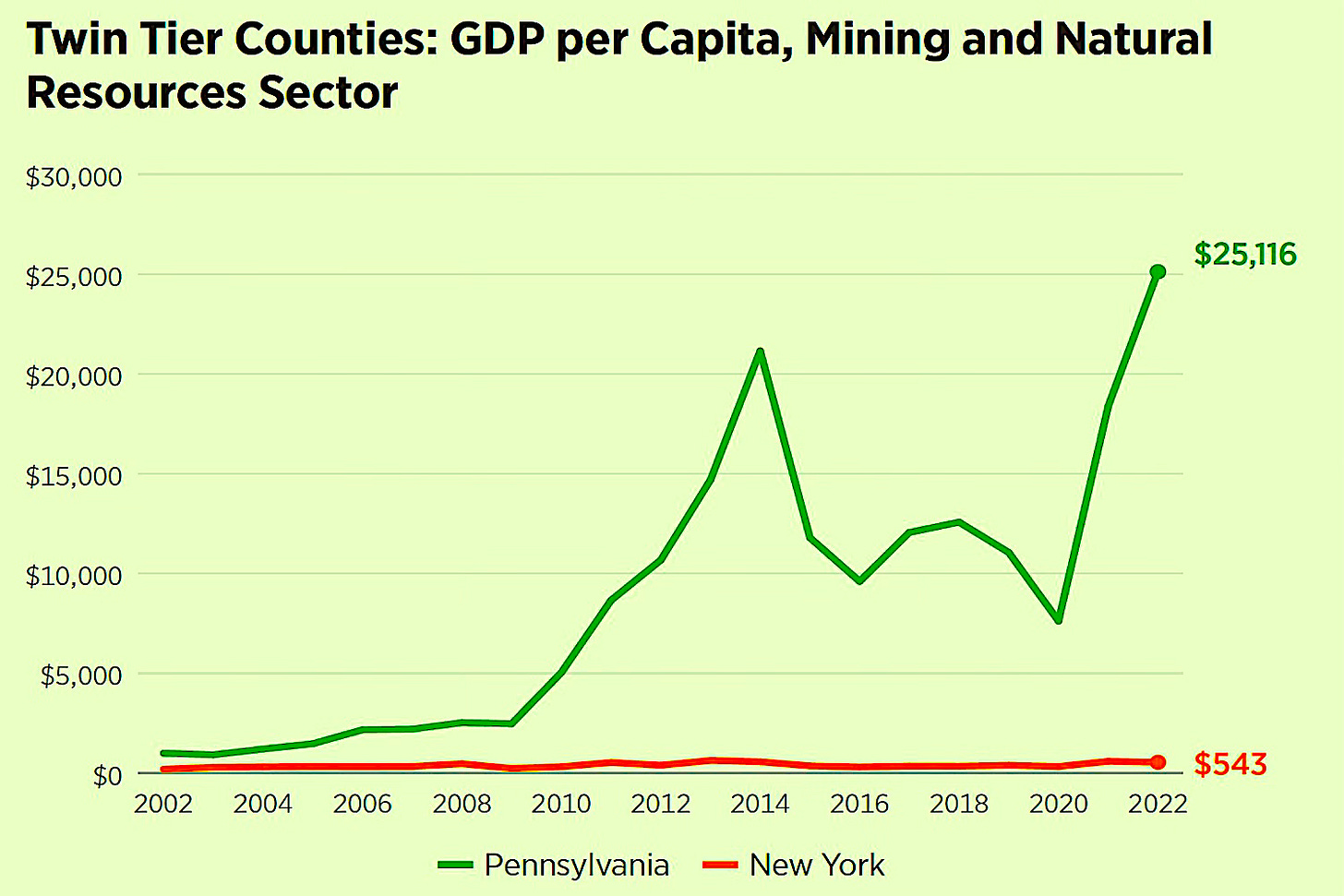NY State's Ban on Shale Drilling: Repost from Energy Security and Freedom
Perhaps someday New York State will rectify their mistake
I distinctly remember the first and only time that I appeared on a Broadway stage. I was not there as an actor. I was giving a speech at an energy symposium held in a Broadway theater in 2012. I stood behind the podium, looked out at the full house of people, and said to myself, “Well, you finally made it to Broadway, but they may pull you offstage with a hook after they hear your message.”
The theme of the meeting was drilling in the Marcellus Shale, and I had been invited to be a keynote speaker about the impacts of drilling in the Barnett Shale. I had a stack of slides showing the economic benefits that drilling had brought to North Texas, including the millions of dollars in royalty payments to individuals, increased employment, and the property taxes that school districts and municipalities enjoyed. My overall theme was that drilling translates directly into economic development, and New York State should seize the opportunity by allowing drilling in the Marcellus Shale. I told the crowd that New York State would make a big mistake regarding lost economic development and state revenues by banning drilling and fracking.
They did not listen to me or anyone else who encouraged the state to take advantage of the economic opportunities that drilling and hydraulic fracturing offered. On December 14, 2014, the State of New York passed a law banning hydraulic fracturing in the Marcellus Shale. Just to be sure that no one ever had second thoughts about the ban, the New York legislature enacted a permanent legislative ban in 2020 as part of the state budget bill. The ban remains in place today.
The Heritage Foundation recently published an excellent study highlighting the hard facts about New York's bad decisions, titled “Hydraulic Fracturing and Economic Outcomes: A Study of Marcellus Shale Counties in Pennsylvania and New York.” I did not see it until my friend and fellow Substack writer, Tom Shepstone, who lives in Northeastern Pennsylvania, wrote about it on his Substack “Energy Security and Freedom.” I am reprinting Tom’s Substack article below, and I highly recommend you check out his Substack. He publishes some great stuff.
____________________________________________________________________________
Upstate New Yorkers Have Given Up $11,000 Per Capita in GDP Thanks to A Fracking Ban No Longer Tolerable.
Thomas J Shepstone, Energy Security and Freedom
April 17, 2025
The Heritage Foundation, perhaps sensing an opportunity under Trump to finally bring the science of hydraulic fracturing and a pipeline or two to New York, has come out with a report showing why it’s essential for the Empire State to get with the times before it crumbles into obscurity.
Titled “Hydraulic Fracturing and Economic Outcomes: A Study of Marcellus Shale Counties in Pennsylvania and New York,” the study does a brilliant job of comparing the economies of Pennsylvania’s Northern Tier counties with New York’s Southern Tier counties. The results are not surprising to anyone who has followed the stats, but should open the eyes of many New Yorkers.
There is a wealth of data in the report, but the charts alone tell the story extremely effectively. Consider this one, for example:
Notice how the growth in GDP per capita for the Pennsylvania counties jumped up and began exceeding that of New York State counties around 2009, when fracking took off and starting lifting the economies of those areas where it was taking place.
More evidence of the role of fracking in this trend is provided by two more charts. First, there is this one showing GDP per capita trends with mining and natural resources industries excluded from the numbers:
Pennsylvania counties were generally gaining on New York over the entire two decades examined but never exceeded it in a meaningful way. Pennsylvania being a lower tax and less regulated state, this is not surprising but the gains have, nonetheless, been slow.
The difference in GDP per capita made by mining and natural resource industries is depicted in a third chart:
The study concludes with the following:
This indicates that, after the 2010 ban, New York’s Twin Tier counties experienced a significant relative decline in GDP per capita compared to their Pennsylvania counterparts, with an estimated loss of approximately $11,000 per capita…
These findings strongly support the hypothesis that the economic divergence between New York and Pennsylvania counties was driven by the policy decision to ban hydraulic fracturing…
This Special Report evaluates the economic effects of hydraulic fracturing in Pennsylvania and New York, focusing on the Twin Tier region. Using a difference-in-differences approach, the analysis compares the economic outcomes of Pennsylvania’s fracking-friendly policies with New York’s 2010 ban.
Data from 2002 to 2022 reveal that New York’s southern counties, which share geological similarities with Pennsylvania’s Twin Tier counties, lost approximately $11,000 in GDP per capita ($27,000 per household) due to the ban.
The study also identifies significant job creation and income growth in Pennsylvania as direct and indirect results of fracking, while New York’s ban led economic opportunities in its rural communities to stagnate.
Based on these results the authors conclude that New York lawmakers did not act in the best interests of their constituents by banning hydrofracturing. By overestimating the risk associated with the practice…, they stripped their constituents of lucrative income associated with hydraulic fracturing. Furthermore, the research presented here shows that jobs increased significantly in Pennsylvania counties which fully embraced the practice.
Therefore, New Yorkers living in Marcellus Shale counties should urge their lawmakers to lift the ban. Lawmakers in other areas of the United States with fracking bans should also reconsider these unnecessary and economically harmful bans.
That sums it up perfectly. New York can no longer afford the luxury of green virtue signaling to please a bunch of condescending Manhattanites.
Thank you for reading “Thoughts about Energy and Economics.” This publication is reader-supported, so please “like” it, share it with friends and colleagues, and become a paid subscriber. Your support is greatly appreciated!









My brother owner a home in rural Ontario County New York. He tells me that natural gas bubbles up in the creeks around him, but the State won't allow anyone to tap it. He just shakes his head .